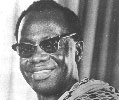Kofi Abrefa Busia
| Kofi Abrefa Busia | |
|---|---|
 |
|
|
Prime Minister 2nd Republic of Ghana |
|
|
In office 1 October 1969 – 13 January 1972 |
|
| President |
Brigadier Akwasi Afrifa
3 April 1969 – 7 August 1970 Nii Amaa Ollennu
7–31 August 1970 Edward Akufo-Addo
31 August 1970 – 13 January 1972 |
| Preceded by |
Kwame Nkrumah
as Prime Minister |
| Succeeded by |
None
(position abolished) |
| Personal details | |
| Born |
July 11, 1913 Wenchi, Gold Coast |
| Died | August 28, 1978 (aged 65) Oxford, United Kingdom |
| Political party | Progress Party |
| Spouse(s) | Naa Morkor Busia (died 2010) |
| Profession | Academic |
| Religion | Christian |
|
Elected following military rule and overthrown by military regime.
|
|
Kofi Abrefa Busia (11 July 1913 – 28 August 1978) was Prime Minister of Ghana from 1969 to 1972. As a nationalist leader and Prime Minister, he helped to restore civilian government to the country following military rule.
Busia was born a prince in the kingdom of Wenchi, in the Brong Ahafo Region, one of the four Gold Coast Territories, then under British rule and now called Ghana.
He was educated at Methodist School, Wenchi, Mfantsipim School, Cape Coast, then at Wesley College, Kumasi, from 1931 to 1932. He later became a teacher at Achimota School. He gained his first degree with Honours in Medieval and Modern History from the University of London, through correspondence during this period. He then went on to study at University College, Oxford, where he was the college's first African student. He took a BA (Hons) in Philosophy, Politics, and Economics (1941, MA) 1946) and a DPhil in Social Anthropology in 1947, with a thesis entitled "The position of the chief in the modern political system of Ashanti: a study of the influence of contemporary social changes on Ashanti political institutions."
He served as a district commissioner from 1942 to 1949, and was appointed first lecturer in African Studies. He became the first African to occupy a Chair at the University College of the Gold Coast (now the University of Ghana). In 1951 he was elected by the Ashanti Confederacy to the Legislative Council. In 1952, he was Leader of Ghana Congress Party, which later merged with the other opposition parties to form the United Party (UP).
...
Wikipedia
